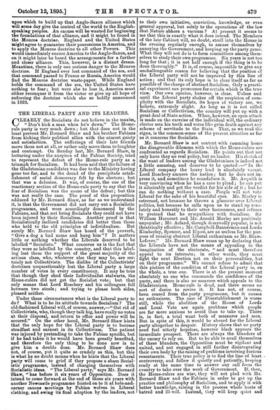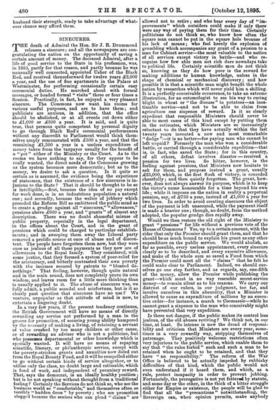THE LIBERAL PARTY AND ITS LEADERS.
CLEARLY the Socialists do not believe in the maxim, "Don't kick a man when he's down." The Home- rule party is very much down ; but that does not in the least prevent Mr. Bernard Shaw and his brother Fabians from kicking their political allies with the utmost gaiety and satisfaction. The sufferings of their late friends move them not at all, or rather only move them to laughter and contempt. On Sunday last, Mr. Bernard Shaw, in lecturing under the auspices of the Fabian Society, tried to represent the defeat of the Home-rule party as a triumph for Socialism. It had been said that the failure of the Gladstonian candidates was due to the Ministry having gone too far, and to the dread of the precipitate estab- lishment of social democracy felt by the electors ; but that was a delusion. It was, of course, the cue of the reactionary section of the Home-rule party to say that the fear of Socialism was the cause of the defeat; but this was not really the case. The proof of this proposition adduced by Mr. Bernard Shaw, as far as we understand it, is that the Government did not carry out a Socialistic programme, and were accordingly denounced by the Fabians, and that not being Socialists they could not have been injured by their Socialism. Another proof is that Socialistically inclined candidates did. better than those who held to the old principles of individualism. But surely Mr. Bernard Shaw has heard of the proverb, "Give a dog a bad name and hang him" ? It matters little or nothing whether the Liberals deserved to be labelled " Socialists." 'What concerns us is the fact that they were so labelled by the country, and that this label- ing lost them the support of the great majority of the artisan class, who, whatever else they may be, are cer- tainly. not Collectivists. The dislike of the Collectivists' doctrines unquestionably lost the Liberal party a large number of votes in every constituency. It may be true that though they shed their Individualist stalwarts, the Home-rulers did not get the Socialist vote ; but that only means that Lord Rosebery and his colleagues fell between two stools ; and trying to please both sides, pleased neither.
Under these circumstances what is the Liberal party to do ? What is to be its attitude towards Socialism ? The old-fashioned Liberal will, of course, answer,.—" Get rid of Collectivists, who, though they talk big, have really no votes at their disposal, and return to office and power will be secured." On the other hand, Mr. Bernard Shaw hints that the only hope for the Liberal party is to become steadfast and earnest in its Collectivism. The patient was injured by pretending to take the Fabian specific, but if he had taken it he would have been greatly benefited, and therefore the only thing to be done now is to give him a double dose. Mr. Bernard Shaw does not, of course, put it quite so crudely as this, but this is what he no doubt means when he hints that the Liberal party will come to grief if they propose a sham Social- istic programme, instead of charging themselves with Socialistic ideas. " The Liberal party," says Mr. Bernard Shaw, " has before it six years of Opposition. Does it intend to come forward at the end of those six years with another Newcastle programme foisted on to it at hole-and- corner caucus meetings by Fabian wolves in Liberal clothing, and owing its final adoption by the leaders, not to their own initiative, conviction, knowledge, or even general approval, but solely to the operations of the law that Nature abhors a vacuum ? At present it seems to me that this is exactly what it does intend. The Members of the late Cabinet will, no doubt, stroll into the House in the evening regularly enough, to amuse themselves by annoying the Government, and keeping up the party game. What they will not do is to form committees among them- selves to study their own programme. Six years is not too long for that ; it is not half enough if the thing is to be done thoroughly." It is, of course, impossible to give any unchallengeable reason for believing that the position of the Liberal party will not be improved by this line of action ; and that its only hope is to clear itself as far as possible of the charge of abstract Socialism. Only a practi- cal experiment can pronounce for certain which is the true view. Our own opinion, however, is clear. Unless and until the Liberal party shakes off the suspicion of com- plicity with the Socialists, its hopes of victory are, we believe, extremely slight. As long as it is not called Socialism or Collectivism, the country will put up with a great deal of State action. When, however, an open attack is made on the exercise of the individual will, the ordinary elector sets his teeth and votes like grim death against any scheme of servitude to the State. That, as we read the signs, is the common-sense of the present situation as far as it concerns the Socialists.
Mr. Bernard Shaw is not content with ramming home the disagreeable dilemma with which the Home-rulers are confronted as regards Socialism. He points out that not only have they no real policy, but no leader. His sketch of the want of leaders among the Gladstonians is indeed not a little amusing, and deserves to be quoted :—" In the Liberal company the heavy lead is absolutely vacant. Lord Rosebery amuses the nation ; but he does not im- press it, and sometimes he scandalises it. Mr. Asquith is very convincing when he has a case to plead ; he can put it admirably and get the verdict for his side of it ; but he can do nothing without a case. People will not vote Liberal for the sake of his beautiful eyes. Mr. Morley is esteemed, not because he throws a glamour over Liberal politics, but because he calls upon us to stand up reso- lutely and honestly to their utter barrenness, and refuses to pretend that he sympathises with Socialism. Sir William Harcourt and Mr. Arnold Morley are positively unpopular ; Mr. Acland, though deservedly popular, is not theatrically effective ; Mr. Campbell-Bannerman and Lords Kimberley, Spencer, and Ripon, are as useless for the pur- pose of rousing abstract Liberal enthusiasm as Mr. Shaw- Lefevre." Mr. Bernard Shaw sums up by declaring that. the Liberals have not the means of appealing to the imagination of the electorate, " and must therefore appeal to its interests ; in other words, they must fight the next Election not on their personalities, but on their programme." We cannot refuse to admit that this picture of the condition of the Liberal party is, on the whole, a true one. There is at the present moment absolutely no one who commands the confidence of the party, and there is also no measure which appeals to the Gladstonians. Home-rule is dead, and there seems no sort of desire to revive it. It has not, of course, been erased from the party programme, but it causes no enthusiasm. The case of Disestablishment is worse still, while the abolition of the House of Lords and Local Veto are again problems which people are far more anxious to avoid than to take up. There is, in fact, a total want both of measures and men. But in spite of this, it would be absurd for the Liberal party altogether to despair. History shows that no party need feel utterly hopeless, however black appears the immediate prospect. There are always the blunders of the enemy to rely on. But to be able to avail themselves of these blunders, the Opposition must be vigilant and united, and not engaged in still further disintegrating their own body by the raising of problems involving furious resentments. Their true policy is to find the line of least controversy, and follow it quietly and patiently, keeping ready at the same time to answer any call from the country to take over the work of Government. If, then, the Home-rulers are wise, they will not plod with Mr. Bernard Shaw and the Fabians in order to get up the practice and philosophy of Socialism, and to apply it with better knowledge, raising in the process whole hosts of hatred and ill-will. Instead, they will keep quiet and husband their strength, ready to take advantage of what- ever chance may afford them.



















































 Previous page
Previous page